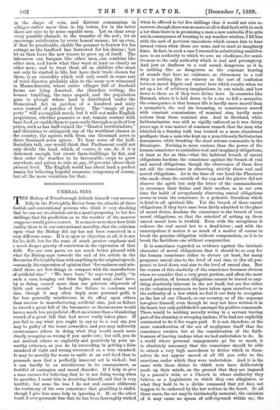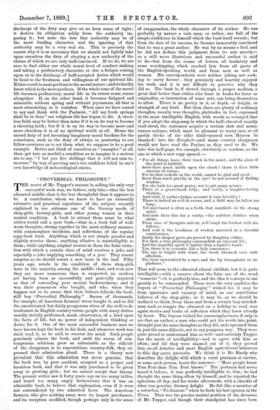UNREAL SINS.
THE Bishop of Peterborough defends himself very success- fully in the Fortnightly Review from the attacks of those foolish and conventional persons who think it very shocking that he can see no absolute sin in a man's proposing to bet five shillings that his prediction as to the weather of the morrow (suppose) would prove correct. It seems to us to show how little reality there is in our conventional morality, that the criticism upon what the Bishop did say has not been conceived in a very different sense. If it is open to objection at all, it is not for its drift, but for the want of much greater emphasis and a much deeper gravity of conviction in the expression of that drift. For our own parts, we are much better pleased with what the Bishop says towards the end of his article in the December Fortnightly than with anything in the original speech, —namely, his expression of opinion that "for rashness and mis- chief there are few things to compare with the manufacture of artificial sins." " We have been," he says very justly, "in such a case, hanging out false lights, and may, alas! have, by so doing, caused more than one grievous shipwreck of faith and morals." Indeed the failure to condemn real sins, though it may often imply more personal guilt, is far less generally mischievous in its effect upon others than success in manufacturing artificial sins, just as failure to record a great fall of the barometer or thermometer would have a much less prejudicial effect on science than a blundering record of a great fall that had never really taken place. If you fail to say what you ought to say as to a real sin, you may be guilty of the worst cowardice, and you may indirectly countenance others in doing what they would much more clearly recognise as wrong if you spoke out ; but still, you do not mislead others so explicitly and positively by your -un- worthy reticence, as you do by succeeding in getting a false standard of right and wrong reverenced as a true standard. It may be morally far worse to smile at an evil deed than to persuade men that a perfectly innocent act is wicked; but it can hardly be as mischievous in its consequences, as fruitful of contagion and moral disorder. If I help to give a man excuses for believing that he is not doing wrong when he gambles, I assist him in deceiving himself, and that is very hurtful ; but none the less I do not and cannot obliterate the testimony of his own conscience that gambling is sinful, though I give him some help in ignoring it. If, on the other hand, I over-persuade him that he has been thoroughly wicked when he offered to bet five shillings that it would not rain to.. morrow, though there was no more at all to find fault with in such a bet than there is in promising a man a new umbrella if he gets wet in consequence of trusting to my weather-wisdom, I fill him with the sort of perverse uneasiness which causes him to hear inward voices when there are none, and to start at imaginary fears. In fact, in such a case I succeed in substituting sensitive- ness to an authority to which we owe no obedience, for sensi- tiveness to the only authority which is real and peremptory. And just as deafness to a real sound, dangerous as it is, is nothing like as dangerous as the constant hearing of sounds that have no existence, so obtuseness to a real duty is nothing like so ruinous as the sort of confusion between moral fidgets and moral laws which results when we set up a lot of arbitrary imaginations in our minds, and bow down to them as if they were divine laws. In countries like Bnrmah, where it is laid down to be a sin to kill a mosquito, the consequence is that human life is hardly more sacred than a mosquito's, the real sin becoming, to consciences seared with constant commissions of nominal sins, hardly more serious than those nominal sins. And in Scotland, while Sabbatarianism was still so rigidly enforced as it was thirty years ago, it was matter of common remark that the man who whistled in a Sunday walk was treated as a more abandoned profligate than a man who kept up a punctiliously Sabbatarian demeanour, while breaking the most solemn commands in the Decalogue. Nothing is more curious than the power of the human conscience to assimilate real and imaginary obligations, at least so far as this,—that the habitual breach of unreal obligations hardens the conscience against the breach of real and sacred obligations, though the observance of them does not aid the conscience in observing strictly those real and sacred obligations. As in the time of our Lord the Pharisees who made clean the outside of the cup and the platter did not observe the spirit but only the letter of the commandment to reverence their father and their mother, so in our own time the habit of scrupulously observing unreal obligations seems to train the conscience to a pedantic literalism which is fatal to all spiritual life. Yet the breach of these unreal obligations, if they have once been fairly admitted to the place of moral duties, deadens the conscience to the breach of true moral obligations, so that the mischief of setting up these unreal moral laws is twofold. Even with the scrupulous it reduces the real moral law to a dead-letter ; and with the unscrupulous it makes it as much of a matter of course to break the genuine obligation without compunction, as it is to break the factitious one without compunction.
It is sometimes regarded as evidence against the intrinsic character of moral obligations, that it should be so easy for the human conscience either to elevate (at least, for many purposes) unreal sins to the level of real sins, or (for all pur- poses) to level down real sins to the level of unreal sins. But the reason of this elasticity of the conscience becomes obvious when we consider that a very great portion, and often the most sacred portion, of human obligations cannot be traced to any- thing absolutely inherent in the act itself, but are due either to the voluntary contracts we have taken upon ourselves, or to the authority of a law which we feel it our duty to recognise as the law of our Church, or our country, or of the supreme law-giver himself, even though he may not have written it in the heart, but only published it amongst his positive commands. There would be nothing morally wrong in a servant leaving part of his cleaning or sweeping undone, if he had not explicitly contracted to do it for wages paid. It is not, therefore, at the mere consideration of the act of negligence itself that the conscience awakes, but at the consideration of the faith- lessness of leaving undone what we had undertaken to do. In a world where personal engagements go for so much, it is absolutely necessary that the conscience should be able to attach a very high sacredness to duties which in them- selves do not appear sacred at all till you refer to the sanctions under which they were undertaken. And it is the same with those duties to which men have deliberately made up their minds, on the ground that they are imposed by a parent's wish, or a Church in whose authority they believe, or a Legislature to which they owe allegiance, or what they hold to be a divine command that yet does not happen to be endorsed by the law written in the heart. In all these cases, the act may be intrinsically unmoral; the omission of it may cause no spasm of self-reproach within us ; the
discharge of the duty may give us no keen sense of right ; it derives its obligation solely from the authority im- posing it ; but none the less that authority may be of the most binding character, and the ignoring of that authority may be a very real sin. This is precisely the reason why it is so necessary that we should not lightly take upon ourselves the duty of obeying a new authority of the claims of which we are only half-convinced. If we do, we are sure to find either our whole moral level of conduct sinking and taking a perfunctory character, or else a fatigue coming upon us in the discharge of half-accepted duties which would be fatal to the freshness and willingness of our spiritual life. Either result is most perilous to the moral nature: andwe hardly know which is the more perilous. If the whole tone of the moral life becomes perfunctory, moral life in its truest sense ceases altogether. If, on the other hand, it becomes fatigued and miserable, without spring and without joyousness, all that is most stimulating in it vanishes. When once we have ceased to say and think with the Psalmist, " All my fresh springs shall be in thee," our religious life has begun to die. A cheer- less faith may be better than none if it is on its way to become a cheering faith ; but if it is on its way to become more and more cheerless, it is of no spiritual worth at all. Hence the sacred duty of not inventing imaginary moral burdens for the conscience, such as the duty of always so posturing to our fellow-creatures as to set them what we suppose to be a good example. Better not think of ourselves as " examples" at all, than get into so morbid a condition as to imagine it a serious sin to say, " I bet you five shillings that it will not rain to- morrow," by way of proving one's too confident belief in one's own knowledge of meteorological omens.























































 Previous page
Previous page